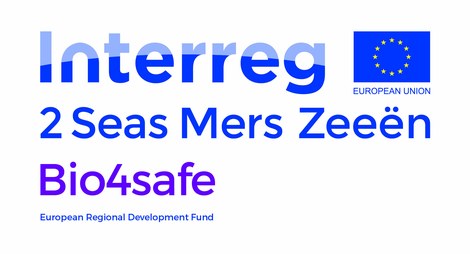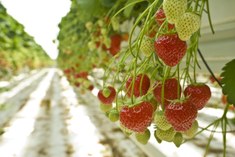Interreg 2 Zeeën - BIO4SAFE
Interreg 2 Zeeën

The Bio4safe project aims to significantly reduce water and fertilizer input in horticulture by making use of commercially available biostimulants and innovative plant sensors. The project, funded by the 2 Seas Interreg Programme is coordinated by the Ornamental Plant Research Centre (PCS, Belgium) and started the 1st of August 2017. Four different research groups of the Ghent University including the Laboratory of Plant Ecology, In Vitro Biology and Horticulture, Isotope Bioscience Laboratory and CropFit are involved in this European project on biostimulants.
Description of the project
The 2 Seas Region (coastal region across the southern North Sea and The Canal) is known for its intensive horticulture which demands significant amounts of water and nutrients. Several EU directives aim to protect water quality by preventing N and P leaching and anticipate to water shortage. Besides these legislative environmental pressures, economic reasons force growers to reduce water and nutrient input. This project aims to improve water and fertilizer use efficiency of plants by using biostimulants (seaweed extracts and beneficial microbes. The combination of biostimulants and innovative plant sensors will result in a reduced input of water and fertilizers by 20% respectively 10%. The project includes demonstration trials on different horticultural crops (lettuce, tomato, hydrangea, strawberry, tulips, chrysanthemum, raspberry) in the four countries to promote the use of biostimulants to diverse target groups. Further, the potential of using biostimulants based on seaweeds in horticulture will be analysed, in order to create economic opportunities for seaweed producers in the 2 Seas Region.
Today, every Member State has its own regulation on commercialising biostimulants. By 2020, the EU will implement a common European legal framework for the trade of biostimulants, but it remains unclear how positive effects of biostimulants on water and nutrient use efficiency of plants should be quantified. Therefore, with this project, we aim to create a standardised protocol that can be used by accredited laboratories to objectively evaluate the impact of biostimulants on water and fertilizer use efficiency of plants.
The project is coordinated by PCS Ornamental Plant Research (Belgium) and includes 7 other partners including Research Station Proeftuin Zwaagdijk (NL), North Sea Farm Foundation (NL), Yncréa Hauts de France, establishment ISA Lille (France), Vegetables Pole Region North (France), NIAB (UK) and Dove Associates (UK) and Ghent University (Belgium). The Bio4safe-project runs for a period of four years and is funded by Europe via the Interreg 2 Seas Programme and the Province East Flanders, Belgium.
This project runs from 01/08/2017 to 30/04/2022.
Objectives
These are the objectives of BIO4SAFE:
- To reduce water input in horticultural crops by 20%
- To reduce fertilizer input in horticultural crops by 10%
- To develop a protocol for policy makers to measure the impact of biostimulants on fertilizer and water use efficiency of plants
- To elaborate a market study to calculate the economic potential of sea weed based biostimulants for sea weed producing companies in the region
Role of Ghent University
The innovative plant sensors used in the framework of the project have been developed at the Ghent University in the laboratory of Plant Ecology, led by Professor Kathy Steppe. Kathy Steppe and her team will install the different plant sensors in the 4 countries to demonstrate how plants can be monitored in situ and online. The project will make use of stable isotopes (Pascal Boeckx, Isotope Bioscience Laboratory) to measure the increased water and fertilizer use efficiency of the plants after treatment with biostimulants. Pascal Boeckx and his team will carry out the isotope analysis and will calculate how the water and fertilizer use efficiency are increased due to application of biostimulants. Professor Marie-Christine Van Labeke’s expertise and the infrastructure of her laboratory (In Vitro Biology and Horticulture) will be used to measure abiotic stress in plants. Maaike Perneel, Business Developer of CropFit will develop a protocol for policy makers to measure the impact of biostimulants on water and fertilizer use efficiency. This protocol may be integrated into the new European legislative framework for biostimulants.
Website
Contact
Maaike Perneel
Business Developer CropFit
+32.9.264.92.02
Maaike.perneel@ugent.be

